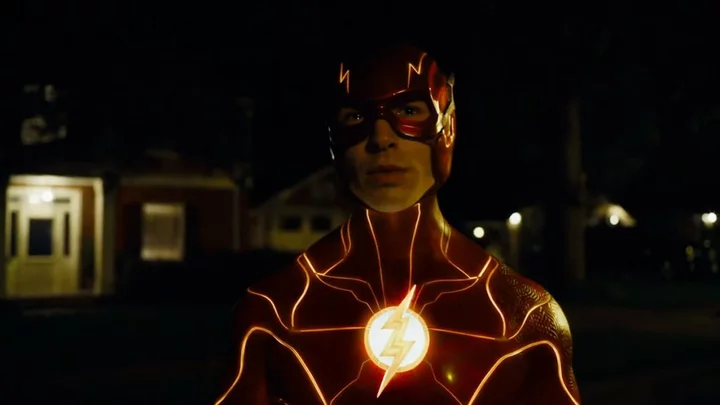
Superman fans compare Christopher Reeve's contrasting cameos in The Flash and Smallville
Warning: This article does contain spoilers for The Flash (2023). If you are in any way interested in superheroes or movies in general you'll no doubt be aware that a new comic book film is being released this week concentrating on the DC character The Flash. It's the first time the scarlet speedster has ever been given a solo movie and despite the controversy surrounding the film's lead star, Ezra Miller, Warner Bros have invested a lot into making this a thrilling experience for fans. The premise of the film is a loose adaptation of the 2011 comic Flashpoint, where The Flash travels back in time to prevent the untimely death of his mother but inadvertently changes the future, as is often the case with time travel movies. As a result, Michael Keaton will be reprising his iconic performance as Batman, a character he hasn't played since 1992 with the likes of Michael Shannon also returning as General Zod and Sasha Calle also delivering a new take on Supergirl. However, people who have already seen the film have noted that several other iconic iterations of these famous characters also make appearances despite some of the actors having already passed away. Many of these are included in the film's climax and feature CGI incarnations of beloved actors like Christopher Reeve as Superman and Adam West as Batman. Other cameos include George Reeves as the Superman from the 1950s, Helen Slater from the 1984 Supergirl movie, Nicolas Cage playing Superman from the unreleased 1990s film and George Clooney reprising Batman from the much maligned 1997 Batman and Robin movie. While The Flash isn't the first movie to use this type of technology (numerous Star Wars titles have already recreated the likes of Carrie Fisher and a younger Mark Hamill for new stories) the use of Reeve's Superman has struck a particularly sour note due to both the messaging and the apparent ugly aesthetic. While Warner Bros is likey to have gotten permission from Reeve's estate to include his likeliness in the film many fans feel that it sets the wrong precedent given that the actor was left paralysed in 1995 before passing away in 2004. Fans of the Superman TV show Smallville have pointed to Reeve's cameo in the show in a 2003 episode which didn't hide his paralysis but respectfully recognised his contribution to the character's legacy and also allowed him to promote his paralysis charity. George Reeves inclusion has also sparked controversy given that the actor ultimately blamed playing Superman for the downfall of his career. His death in 1959 also remains with debates raging over whether he was murdered or took his own life. Given that Reeves is perhaps the least known of all the cameos, fans who have dug into his backstory were shocked that he was included. Ultimately, Warner Bros' owns the rights to Superman and essentially can do whatever they want to with the character but with the growing popularity of multiverses and an over reliance on nostalgia this type of thing will only become more and more common. One thing that we can hope for is that if the technology continues to be used then the tributes will be more tasteful and considered than this time around. Have your say in our news democracy. Click the upvote icon at the top of the page to help raise this article through the indy100 rankings.
2023-06-17 23:59

Perfect Corp. Partners with SELF to Celebrate the SELF Healthy Beauty Awards with AR Virtual Effect
NEW YORK--(BUSINESS WIRE)--Jun 27, 2023--
2023-06-27 18:48

Aaron Ramsey: Riches of Saudi league no contest for ‘priceless’ Cardiff return
Aaron Ramsey says the riches of the Saudi Pro League could not compete with his “priceless” return to Cardiff. The Wales captain had the opportunity this summer to become the first British player to join Saudi Arabia’s lucrative league, ahead of Liverpool captain Jordan Henderson moving there last month. But Ramsey put family first and returned to hometown club Cardiff, where he made his senior debut as a 16-year-old in April 2007 to break John Toshack’s record as the Bluebirds’ youngest-ever player. “There was an offer and there’s plenty of benefits to that offer over there,” said former Arsenal and Juventus midfielder Ramsey, speaking about the Saudi Pro League interest for the first time. “But for me, it wasn’t the right time or the right thing to do for me, my career and for my family. “It can be very appealing and probably depends on a lot of things, on what you’ve done financially, if you’re secure or not and things like that. “For another individual, it might be life changing, but for me, being around my family and things like that is priceless. So you couldn’t put a figure on that. It's a hot topic at the moment. Obviously, there are financial rewards for going there - probably very rewarding - and a lot of players can't see past that sort of thing Aaron Ramsey on the Saudi Pro League Saudi Arabia has emerged as a powerful influence in world football that has seen a huge influx of talent to the Saudi Pro League. It is estimated that Saudi Arabia’s football-related spending has exceeded £3.5billion in the past two years with a host of players following Cristiano Ronaldo to the Middle East kingdom. Ramsey told Sky Sports: “It’s a hot topic at the moment. Obviously, there are financial rewards for going there – probably very rewarding – and a lot of players can’t see past that sort of thing. “I think obviously it depends on the individual situation. I think I’ve been very fortunate in my career that I’ve done OK so far. “So there’s plenty of factors that go into people’s decisions, but I’ve made mine based on my situation.” Ramsey makes his third Cardiff debut – he had a short loan spell there in 2011 after suffering serious injury at Arsenal – at Leeds on Sunday with excitement swirling around the Bluebirds. Despite being under an EFL transfer embargo that has prevented them from paying fees for players, new boss Erol Bulut has strengthened a squad that flirted with relegation from the Sky Bet Championship last season. Bulut has signed six players in total with former Reading striker Yakou Meite and West Brom loanee Karlan Grant among the arrivals. “I like the way the manager has come in and put down his own stamp so far,” said Ramsey. “He’s very positive and so is the style of football that he wants to try and play. “He’s managed Fenerbahce – one of the top teams in Turkey – and is used to the expectations and pressures at the highest level to be able to perform and to win games. “The club had some great years at the highest level and that is something we want to try and bring back here. “So hopefully not too long in the future, we can see Cardiff back in the Premier League.” Read More Charity boss speaks out over ‘traumatic’ encounter with royal aide Ukraine war’s heaviest fight rages in east - follow live Katie Zelem admits World Cup debut was ‘tough moment’ after Keira Walsh injury Arsenal will need ‘unheard of’ points tally to win title – Mikel Arteta Pep Guardiola expects Arsenal summer signings to take them to the next level
2023-08-05 21:21

Chevron poised for mediation talks to avert Australia LNG strike
SYDNEY (Reuters) -Mediation talks to avert strikes at U.S. energy major Chevron's two major liquefied natural gas (LNG) facilities in
2023-09-04 10:19
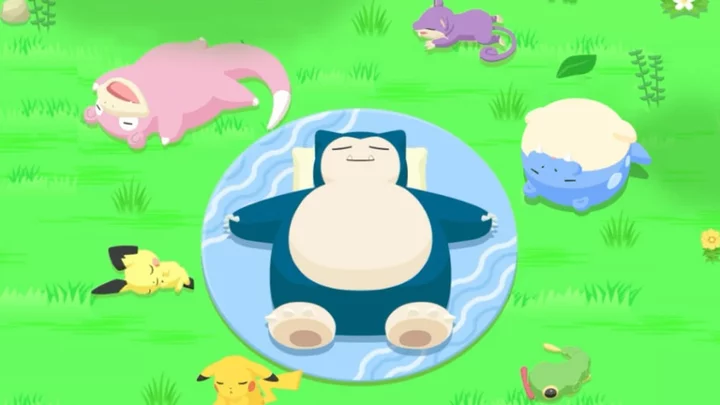
Pokémon Sleep Recipe List: Curries, Salads, Drinks, Desserts
Having trouble figuring out all recipes in Pokémon Sleep? Then this article is for you.
2023-08-12 03:17
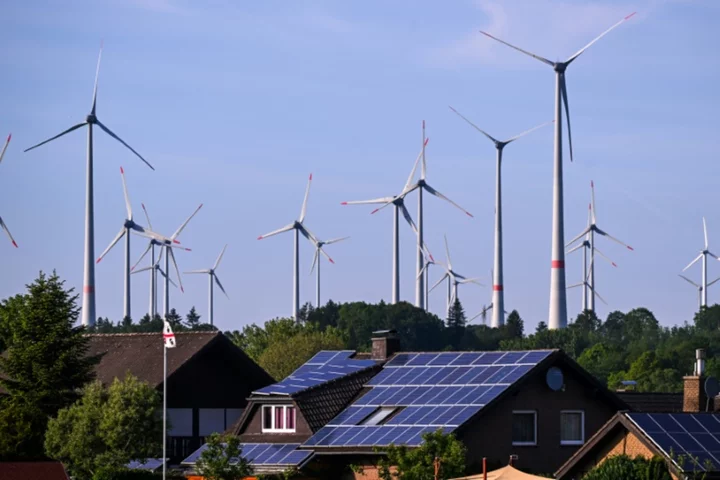
Renewable energy capacity additions to hit record: IEA
Renewable power capacity will grow by a record number this year as high fossil fuel prices and energy security concerns fuelled the deployment of solar and wind systems...
2023-06-01 17:18
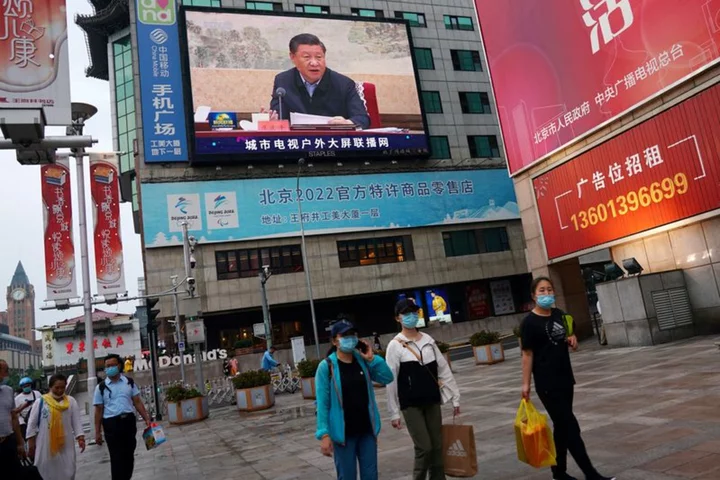
Why is China not rushing to fix its ailing economy?
By Laurie Chen and Yew Lun Tian BEIJING With China at risk of tipping into prolonged stagnation and
2023-08-17 17:29

Greta Thunberg feels the heat for pro-Gaza post, but 'antisemitic' octopus leaves Internet bewildered
Greta Thunberg said, 'We are of course against any type of discrimination, and condemn antisemitism in all forms and shapes'
2023-10-21 19:30

Kansas State 'Pledgesketball' Brawl Features Some Great Sports Jerseys
VIDEO: Kansas State basketball fraternity fight.
2023-08-28 03:24
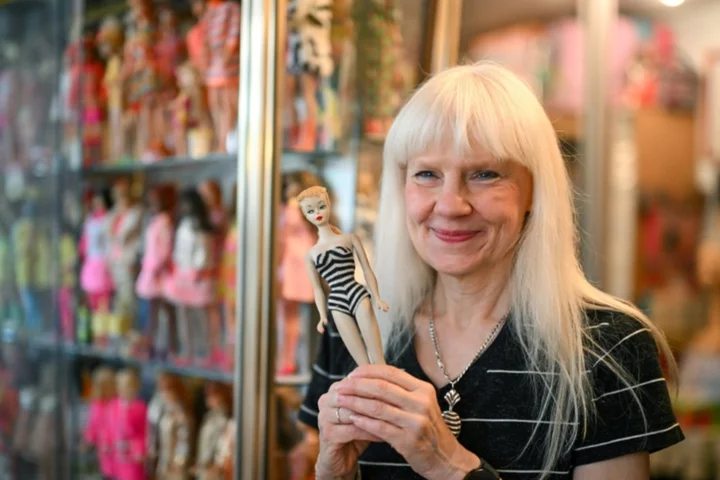
It's fantastic: Movie boosts world's top Barbie collection
With her whopping 18,000 Barbies, Bettina Dorfmann was already in the record books, but the release of the blockbuster about the blonde icon has thrown...
2023-07-26 18:26

Trisha Paytas announces second pregnancy and already has unique name picked out
Trisha Paytas has announced they are pregnant with their second baby - and has already picked out a unique name for their unborn child. Taking to Instagram, the 35-year-old controversial YouTuber - who identifies as non-binary and uses she/they pronouns - shared the news that they and husband Moses Hacmon are going to be parents again. "?Thankful? Baby #2 coming May 2024," Paytas wrote as the post caption, with snaps of the couple together holding sonogram photos along with their one-year-old daughter Malibu Barbie. Paytas also revealed the name of baby number two in a TikTok video that showed some behind-the-scenes clips of the photoshoot. It appears the expectant parents were inspired by the King of Rock 'n' Roll himself when choosing the name. "We did already announce the baby's name is going to be Elvis, while we don't know the gender yet - boy or girl - we're having baby Elvis and we couldn't be more excited," they said. @trishlikefish88 Paytas who gave birth to Malibu Barbie on September 14 last year and around this time a bizarre conspiracy theory circulated online that they had already given birth and that the baby was the reincarnation of Elizabeth II who passed away on September 8. On their podcast 'Just Trish,' the social media star who addressed this once more after announcing their second pregnancy - as they hope another royal death doesn't coincide with their birth once more. "Please no royalty die in May I swear to goodness if the King dies or something and they say it's my baby," they said. "I have the fear of the royal family at all times." To which Hacmon jokingly interjected: "We are giving birth to the King," referencing the fact that they're naming their baby Elvis. Of course, the announcement prompted memes online about how concerned King Charles should be about Paytas being pregnant again. How to join the indy100's free WhatsApp channel Sign up to our free Indy100 weekly newsletter Have your say in our news democracy. Click the upvote icon at the top of the page to help raise this article through the indy100 rankings.
2023-11-22 20:52
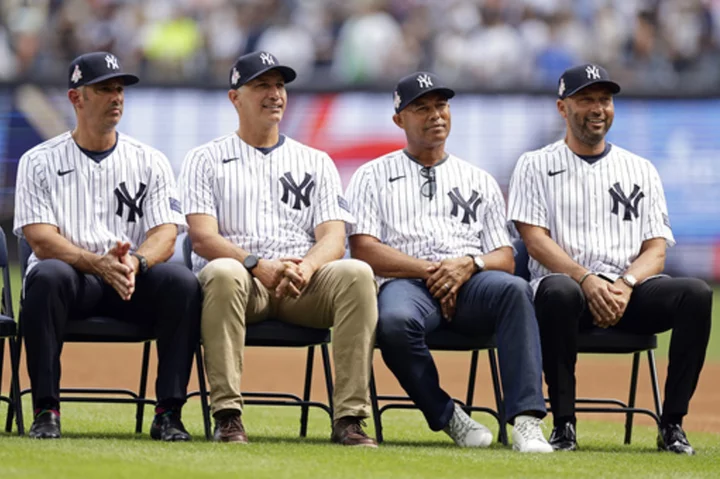
Jeter returns as Yankees honor 1998 team at Old-Timers' Day, Boone booed by some
Derek Jeter attended his first New York Yankees Old-Timers’ Day as New York celebrated the 25th anniversary of the 1998 team that won 125 games
2023-09-10 03:51
You Might Like...
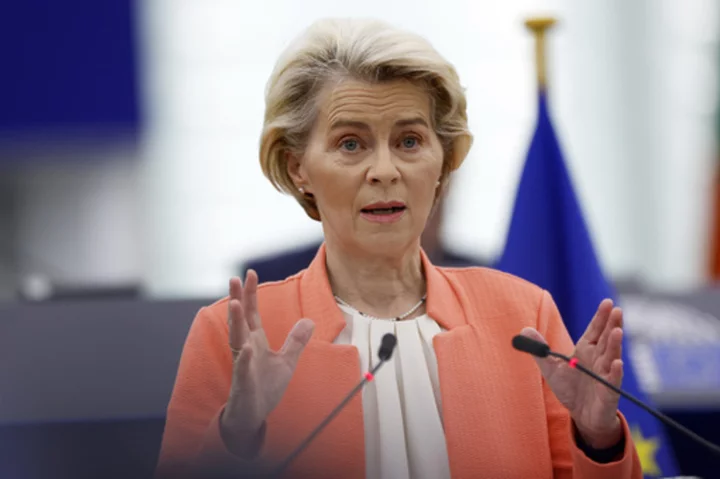
EU announces an investigation into Chinese subsidies for electric vehicles

Florida man fatally shoots aunt's boyfriend after heated argument over gun safety on July 27

Tua Tagovailoa throws for 3 TDs, Jalen Ramsey shines in debut for Dolphins, who beat Patriots 31-17
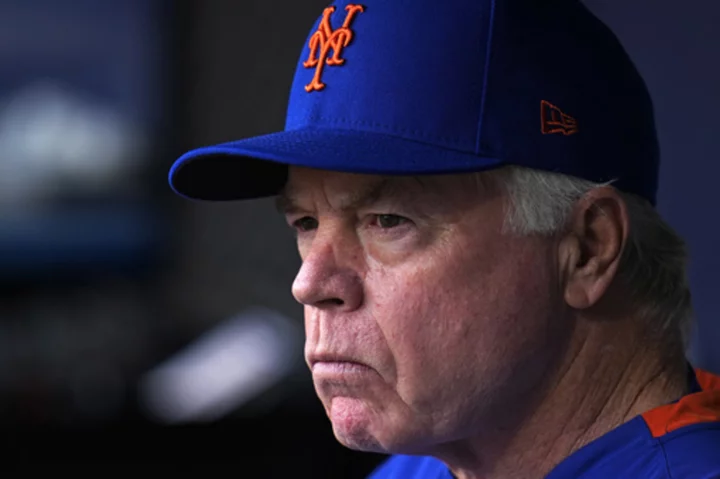
Showalter, Eppler are optimistic ahead of Mets owner Cohen's press conference

CO2 pollution expected to hit new record in 2023: researchers

5 reasons the Golden State Warriors season could end with a championship in 2024
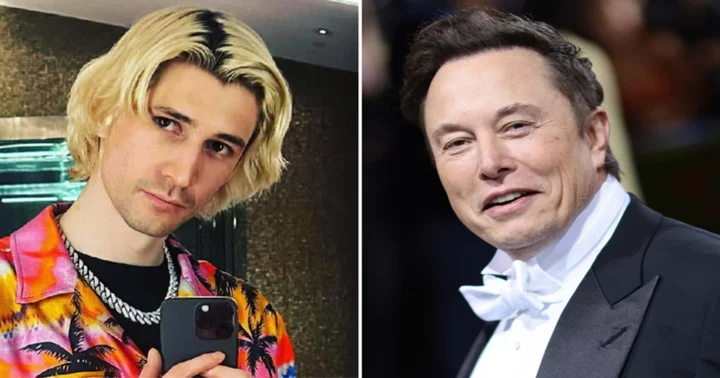
xQc shares views on Elon Musk's 'Diablo 4' livestream on X: 'Bro forgot to comment he was live'

Judge rejects US bid to restrict American Airlines, JetBlue deals
